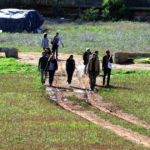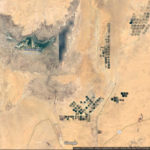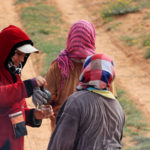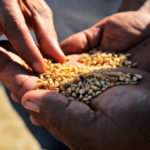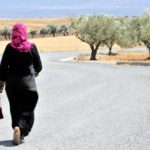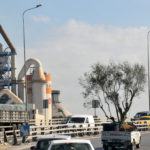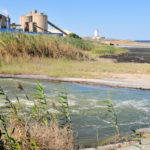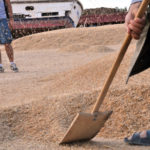Since the end of French colonization in 1956, successive Tunisian governments have managed to ensure access to healthy and sufficient food for the vast majority of its citizens. Tunisia has a low level of hunger, with a 2018 score of 7.9 out of 50 on the Global Hunger Index (GHI), and this number has continued to trend downwards. Most Tunisians eat their fill and some even allow themselves luxury food products from time to time. Physical access to something to eat without too much trouble is not the challenge. The question is, given the context of a stagnant economy and high unemployment: at what cost?
Continuer à lireDans la presse
How Egypt’s water feeds the Gulf
Vast expanses of green extend across the horizon, tended by the advanced machinery that has replaced hundreds of agricultural workers. The land is watered using center-pivot irrigation systems, connected to one another in a series of canals through which water is driven by one of the biggest water pump stations in the world. A number […]
Continuer à lireBuilding Food Sovereignty in Tunisia
The Tunisian government is in high-level talks to remove the last crumbling barriers protecting Tunisian agriculture. Efforts to capitalize on the ‘comparative advantage’ of Tunisia’s nearly year-round sunshine has already forced a shift toward production of fruit and vegetables for export, and increasing dependence on imports for the basic cereals that make up most Tunisian diets. As the nation’s agriculture turned to meet the demands of Europe over the last 25 years, poverty in the countryside swelled. If the changes go through, it would cement dependence on the European trading system, and decimate what is left of Tunisia’s diverse peasant agriculture.
Continuer à lireSortir de l’ALECA et de l’ensemble du système alimentaire mondial : Pour une nouvelle politique agricole et alimentaire souveraine qui rompt définitivement avec la dépendance alimentaire et les marchés internationaux
Habib Ayeb** Un.e tunisien.ne sur deux se nourrit actuellement de l’étranger. Notre dépendance alimentaire dépasse déjà les 55% de nos besoins. Pourtant, cette situation ne correspond à aucune fatalité. Contrairement à ce que la grande majorité des experts et des décideurs affirment, contre toute évidence, la Tunisie dispose de suffisamment de ressources naturelles (eaux, terres…) […]
Continuer à lire25/30 settembre 2018: le giornate della sovranità alimentare e dell’ambiente
Reportage di Patrizia Mancini in collaborazione con Hamadi Zribi C’è una questione in Tunisia che è poco conosciuta e dibattuta al di fuori degli ambienti specializzati, e alla quale scarsa attenzione hanno dedicato le scienze sociali e la stessa politica: la questione agricola con la problematica ad essa connessa della gestione e protezione delle risorse locali e […]
Continuer à lireOui pour l’égalité de l’héritage… mais attention aux conséquences possibles sur la question foncière et alimentaire
Par : Habib Ayeb La proposition de modification de la loi sur l’héritage vers une égalité hommes/femmes annoncée par la commission Colibe a été reprise par le président de la république. Les débats et réactions ont montré une claire divergence entre ceux qui défendent la proposition au nom de l’égalité des droits et ceux qui s’y […]
Continuer à lireOn the Road: Food Sovereignty in Tunisia
By Ray Bush The Observatoire de la Souveraineté Alimentaire et de l’Environnement (OSAE) is a new innovative and exciting NGO focused on promoting food sovereignty, positive environmental transformation and they do this with ideas and actions of small-scale family farmers. Based in Tunis, the brainchild of Habib Ayeb, it has a small staff of engaged […]
Continuer à lire« What lasted for 3000 years has been destroyed in 30 »: the struggle for food sovereignty in Tunisia
By Max Ajl Gabès, the Tunisian South’s garden-city, is otherworldly. It is the world’s only maritime oasis, and very different from the Saharan or desert groves which the term tends to call up in the mind’s eye. Natural sweet springs have nourished horticulture and arboriculture there for millennia, back to Carthaginian times, forming the basis […]
Continuer à lireLes politiques agricoles et alimentaires dans la presse tunisienne
Revue de la presse tunisienne du mois de juin 2018 Par Aymen Amayed Dans un contexte socio-économique difficile, la Tunisie peine à trouver son équilibre dans le secteur vital de la politique agricole et alimentaire dont les résultats sont loin d’être encourageants. Cette revue de presse tente de faire le point sur les différentes informations […]
Continuer à lire
